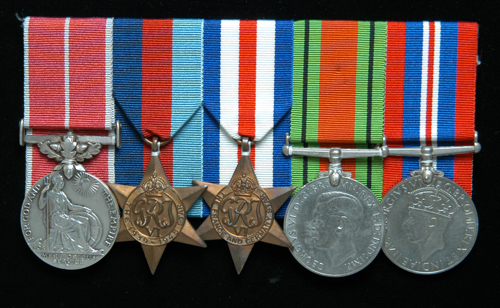
Auction: 7012 - Orders, Decorations, Medals & Militaria
Lot: 368
A Scarce Second World War 1944 Military B.E.M. Group of Five to Sergeant A.E. Kempson, Welsh Guards, Who During Operation Veritable, 1945, ´Had his Bren Gun Nearly Cut in Half by a Bazooka´ a) British Empire Medal, G.VI.R., Military Division (2734082 Sgt. Albert E. Kempson) b) 1939-1945 Star c) France and Germany Star d) Defence and War Medals, nearly extremely fine, mounted court style as originally worn (5) Estimate £ 500-600 B.E.M. London Gazette 8.6.1944 No. 2734082 Sergeant Albert Edward Kempson, Welsh Guards. The Recommendation states: ´Sergeant Kempson joined the Regiment in 1935 and has served with the 1st Bn. since he left the Guards Depot. He went to Gibraltar with the Bn. in 1939 and saw service in France in 1940. Throughout his services he served in the Prince of Wales Company. In 1942 he was recommended for accelerated promotion from L/Sergeant to full Sergeant and this promotion was made. He is now FL. Sgt. of No 1 Platoon. Throughout his service he has proved himself to be a completely reliable man in every way and is an outstanding N.C.O. He is capable of commanding a Platoon both in billets and in the field and is capable of carrying out the duties of C.Q.M.S. in which capacity he is employed in the absence of the C.Q.M.S. He is an extremely good influence in the Company and has boxed and played Rugby for Battalion.´ 2734082 Sergeant Albert Edward Kempson, B.E.M., served during the Second World War with the Prince of Wales Company, 1st Battalion Welsh Guards, with particular distinction during Operation Veritable - the attempt to clear the Rhineland territory lying south of Njimegen between the Roer and the Rhine, February-March 1945. The 1st Battalion Welsh Guards went into action on the 14th February, a week after the offensive was initiated, immediately securing the Gennep area. The Guards Armoured Division was also out in force, with No. 2 Squadron of the 2nd Battalion in action on the same day in the attack on Hommersum, and in support of a battalion of the Black Watch the following day at Kessel. No 1 Squadron continued the mobile offensive at Mull, February 16th, where only two out of nineteen tanks made it to the objective with the advancing infantry. 1st and 2nd Battalions Welsh Guards were put together on the 4th of March, to travel south-east through Goch and Weeze to Kevelaer and Wetten with orders the next day to capture the woods between Kapellan and Bonninghardt. With this objective in sight the newly arrived 2nd Battalion Scots Guards added their considerable presence to the attack. The latter newly arrived from England, had been sent out to relieve the 1st Battalion Welsh Guards. The attack on the woods, after a considerable delay, commenced at 11am, ´The Welsh Guards´ responsibility was the road running through the wood to Bonninghardt and the southern half of the wood; the Scots Guards were on their left and had to clear the northern half; The Light Reconnaissance Squadron of the 2nd Battalion supported the Welsh Guards and No. 3 Squadron the Scots Guards, and all the attackers were greatly helped by the artillery. The Welsh Guards met various pockets of enemy resistance consisting of fanatical paratroops. Lance-Sergeant Austin Joyce, in command of a leading section, came under fire from a Spandau dug in by the side of a farmhouse and another opened fire from the house itself against a platoon attacking on his right flank. He led his section forward in a vigorous attack and the first enemy gunner withdrew to the house. Leaving his section to give covering fire, he ran forward and under of cover of the house-wall threw a grenade in at the window from which the Spandau was firing. His section then joined him in assaulting the house and surrounding buildings, which were captured, together with twenty-six German paratroops. With the help of the tanks the companies eventually fought their way through the wood and reached their objectives in the eastern edge by mid-day, having taken nearly a hundred prisoners. Sergeant Albert Edward Kempson, a Cardiff man, with a platoon of Prince of Wales Company had his Bren gun nearly cut in half by a bazooka.´ (Welsh Guards at War, refers). Having successfully carried the position Kempson and the Prince of Wales Company were part of the force that went on to capture Bonninghardt itself, taking fifty German prisoners. With other Divisions converging on Wesel, the Guards Armoured Division was withdrawn and the 1st Battalion Welsh Guards had fought their last battle of the War.
Sold for
£750




